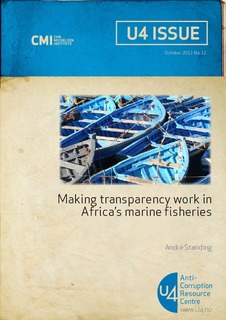| dc.description.abstract | Global problems facing the marine fisheries sector, including overfishing and the marginalization of the small-scale sector, are leading to increased international awareness of the need to improve transparency in fisheries governance. This Issue paper considers the situation in Africa, where access to information on commercial fisheries and related investments, including foreign aid for fisheries development and marine conservation, are generally lacking. It suggests improving transparency may lead to important gains, such as reducing corruption, improving the effectiveness of aid, and combating illegal fishing. However, the extent to which transparency can make a difference in these areas depends on a number of conditions, including the strength of mediating organisations, the strength of accountability mechanisms, and whether there are robust means to allow for ‘principal-led’ transparency. The paper reflects on the value of establishing a dedicated transparency initiative for marine fisheries inspired by the Extractive Industries Transparency Initiative (EITI). | |
